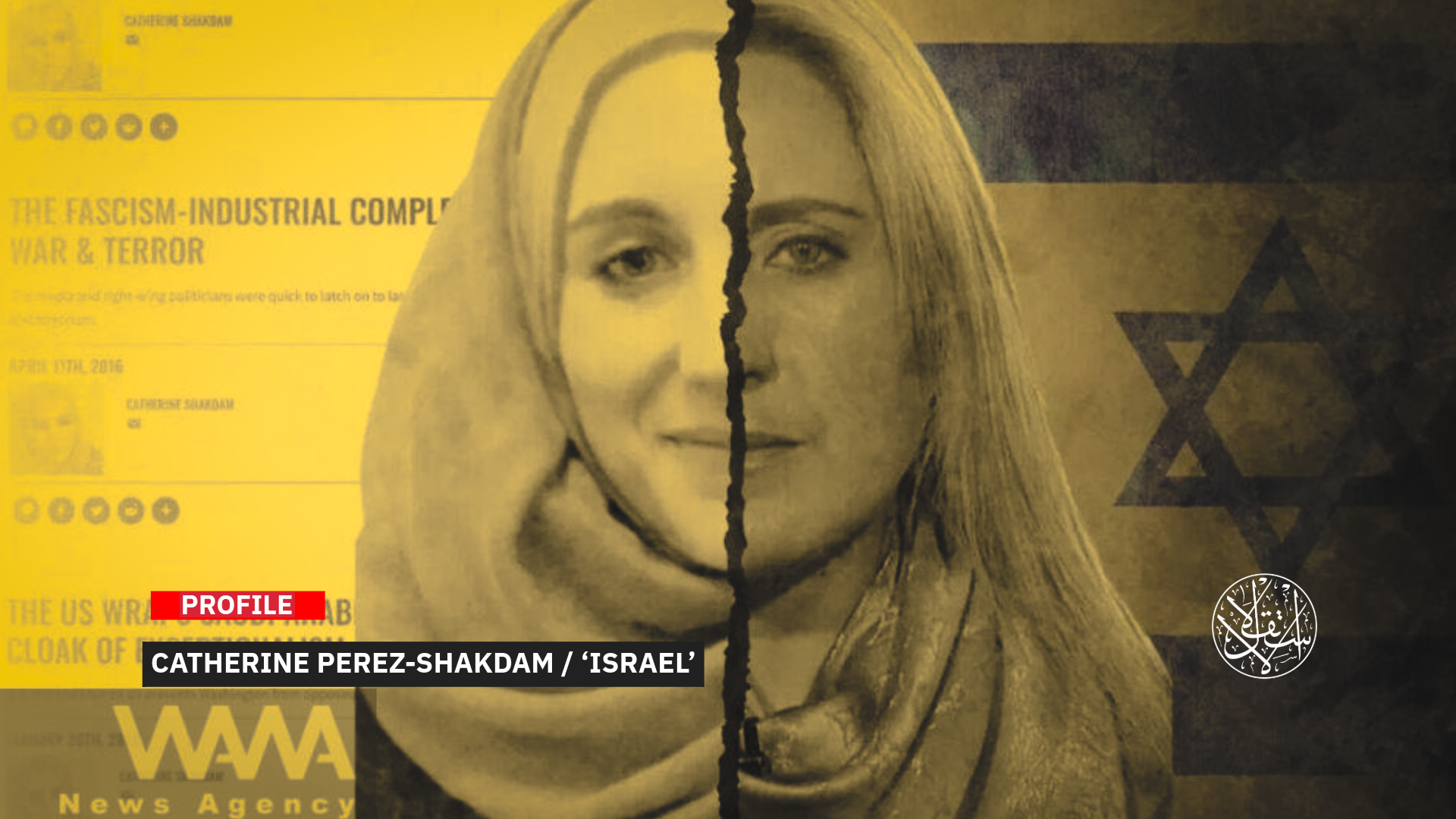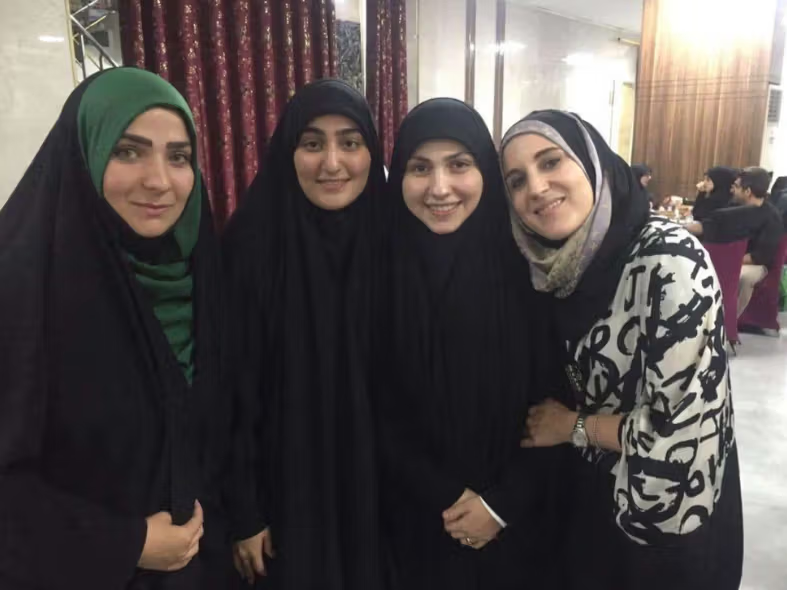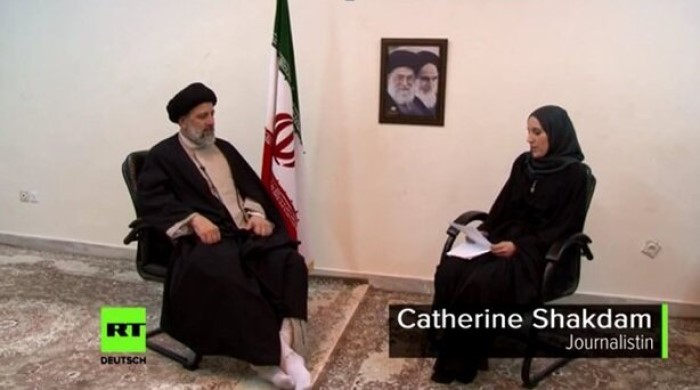Catherine Perez-Shakdam: The Israeli Who Infiltrated Iran’s Government and Ensnared Its Top Officials

Shakdam denied being a Mossad agent during her visits to Iran.
Catherine Shakdam made headlines across Iranian media after former reformist presidential candidate Mostafa Kavakebian accused her of infiltrating the country’s sensitive institutions by engaging in sexual relationships with 120 high-ranking officials.
Kavakebian made these explosive claims during a televised interview on July 10, 2025. Iran’s state broadcaster dismissed the accusations as “obscene and false,” while the Tehran Prosecutor’s Office responded by filing a lawsuit against him for “stirring public opinion,” according to the judiciary-affiliated Mizan News Agency.
Writer and Analyst
Catherine Perez-Shakdam was born in France in 1982 to a secular Jewish family. She has a bachelor's degree in psychology and two master’s degrees—one in finance from the University of London and another in communications. She is interested in politics and Middle Eastern affairs and speaks five languages.
While studying at the University of London, she met her future husband, a Sunni Muslim from Sana’a, Yemen. They got married six months later, when she was 18 years old. They had two children, and she later divorced him in 2014 and took custody of their children.
Speaking about this experience, Shakdam said that marrying a Yemeni Muslim brought her into the heart of the Islamic world. Her work in the Middle East and as a political analyst gave her a unique, even rare, perspective—especially on how a person can lose their identity when facing systematic antisemitism.
On her profile page for The Times of Israel in Hebrew, she says she is determined to share her experience and views on difficult topics like Islamic extremism, terrorism, and antisemitism.
Besides writing for the Israeli newspaper, she also works as the Director of Strategic Advancement and Executive Director of the Israeli Policy Forum. In the past, she was a research fellow at the Henry Jackson Society, an advisor to the UN Security Council on Yemen, and an expert on Iran, terrorism, and Islamic extremism.
The Israeli newspaper describes her as a prominent political analyst and commentator who has spoken extensively about the Islamic Republic of Iran. She was one of the voices calling on the UK to designate Iran’s Islamic Revolutionary Guard Corps as a terrorist organization.
In 2024, Shakdam was elected director of the organization “We Believe in Israel,” a UK-based group that works to strengthen political, media, and social support for “Israel” by building a broad network of Jewish and non-Jewish supporters.

Shia Muslim
Talk about Shakdam working for “Israel” began after she left Iran. After leaving, she changed her stance and began openly criticizing the Iranian government in articles published in The Times of Israel—a position she continues to hold today.
In 2021, she sparked major controversy after publishing an opinion piece in the Israeli paper, where she described her experience in Iran. In the article, she warned about antisemitism and Iran’s nuclear program. She mentioned that some sources had called her “an Israeli spy,” but she denied those claims.
While in Iran—from 2015 to 2018—Shakdam presented herself as a Muslim woman who believed in Shiite principles. Many photos show her attending religious ceremonies like Arba’in, including one picture with Zaynab, the daughter of former Quds Force commander Qassem Soleimani.
On March 27, 2018, the “Thuluth” channel on Telegram—linked to people close to former Iranian president Mahmoud Ahmadinejad—posted a photo of Shakdam. The post claimed she was a writer for Ayatollah Khamenei’s official website and an influencer inside the Israeli system, saying she revealed her influence in Iran in an article for The Times of Israel.
After that, the same channel posted another update: “Right after this news spread, many Iranian news agencies started deleting the articles Shakdam had written. Some media outlets and individuals—including people from the Revolutionary Guard who had previously interviewed her—tried to distance themselves and denied any connection to her.”
Before that happened, Iranian media had interviewed her many times as a political analyst. This included Press TV, the English-language channel of Iran’s official state broadcaster.
She also conducted an interview for Russia’s official RT channel with former Iranian president Ebrahim Raisi when he was running for office in 2017, while he was the head of the Astan Quds Razavi foundation.
Shakdam also published articles in conservative Iranian outlets such as Kayhan newspaper, and the Tasnim and Mehr news agencies. She was presented as a journalist who supported the “Axis of Resistance.” For a time, she worked as a media advisor for some official Iranian institutions and took part in religious gatherings.
It didn’t stop there—she even published articles on the official website of Iran’s Supreme Leader, Ali Khamenei. However, these articles were later deleted after she wrote in The Times of Israel about her trip to Tehran.

‘Mossad Agent’
In response to accusations of spying after she changed her stance on Iran, Shakdam denied the claims during an interview on the BBC Persian program 60 Minutes on March 28, 2022. She said, “I’m not an agent of any state—I went to Iran as an analyst.”
She also said that at that time, she had never been to “Israel,” and never contacted Iranian authorities. Instead, they reached out to her “for propaganda purposes” and invited her to attend the Palestine Conference. “I didn’t chase anyone—they chased me,” she said.
“I never tried to sneak into Iranian media or gain access to power. They asked me to write analyses and do interviews. They invited me to the Palestine Conference, so I went. Iran reached out to me every time. It was also an opportunity for me. I don’t want people to think I took advantage of them.”
When asked if she was aware of the risks of traveling to Iran, Shakdam said she entered the country with her French passport. She said Iranian authorities knew she was Jewish, but because of her Muslim husband and her work, no one suspected her. “They saw me as a propaganda tool for their own agenda,” she explained.
Shakdam, who was seen wearing a hijab in Iran and also wore it in interviews on Iranian TV and elsewhere, explained the change in her dress: “When you travel to Iran, you have to wear the hijab.”
She added that her husband was a Yemeni Muslim, and she wore the hijab out of respect for his family. She stopped wearing it after their divorce. She also denied that her ex-husband had any ties to the Iranian government, saying, “He’s Sunni and not very interested in Iran. In fact, my writing for Iranian media created a rift between us.”
When asked why she insisted on observing the Iranian government up close, she said she wanted to find out whether it opposed all Jewish people in Israel, or just the Israeli government. “Sadly,” she said, “I realized they have a problem with Jews in general—not just with the Israeli government.”
In an article for The Times of Israel, Shakdam claimed that Tehran “is seeking to acquire a nuclear bomb.” However, she emphasized that she has no classified information about Iran’s nuclear program and that this was just her personal opinion and impression of the Iranian government.
She also denied having close personal relationships with Iranian officials and said they never shared any secrets with her. She added, “They are using these statements just to criticize me. I don’t have a problem with that—but in doing so, they’re actually revealing their own doubts.”
“It’s clear that Shakdam is a Mossad agent, and the Mossad itself organized her interview with BBC Persian,” Iranian security expert Fouad Sadeghi published on Ensaf News on November 28, 2022.
“The first instinct of Iranian intelligence agencies when faced with infiltration,” he said, “is to deny it ever happened and bury the issue”—a response he claimed exposes deep flaws in the country’s security apparatus.
Sadeghi sharply criticized the Iranian intelligence community, saying that “not a single agency was alert to what happened.” He argued that, because of systemic weakness and an inability to identify the real perpetrators, authorities often resort to scapegoating—pinning the blame on innocent or low-level individuals through intimidation and coercion, even when they had nothing to do with the case.
“Shakdam’s interview with BBC only served the interests of people she is connected with, and she made it clear that she won’t reveal their identities.”
After “Israel’s” most recent attack on Iran, which lasted 12 days starting on June 13, 2025, Shakdam wrote an article titled Iran’s Kamikaze Doctrine: Strategic Suicide as Deterrence where she claimed that the Islamic Republic does not build its security on survival, but on martyrdom and destruction.
“Only through exposing, disrupting, and disarming Iran’s apparatus of self-destruction can we prevent the greatest tragedy of all: a regime that, true to its apocalyptic vision, burns the house down rather than see it occupied by another.”
Sources
- Ongoing Controversy Over Catherine Shakdam’s Alleged Sexual Relations With 120 Top Iranian Officials [Arabic]
- All about Catherine Schakdam; How did the Jewish woman find her way to Iran? [Arabic]
- Who Is Catherine Shakdam, and Why Is Her Name Making Headlines Again? [Arabic]
- Catherine Shakdam [Arabic]
- Who Is Catherine Shakdam, and Why Is Her Name Making Headlines Again? [Arabic]
- Catherine Perez-Shakdam
- After wartime intel lapses, Iran official revives Shakdam spy caper









